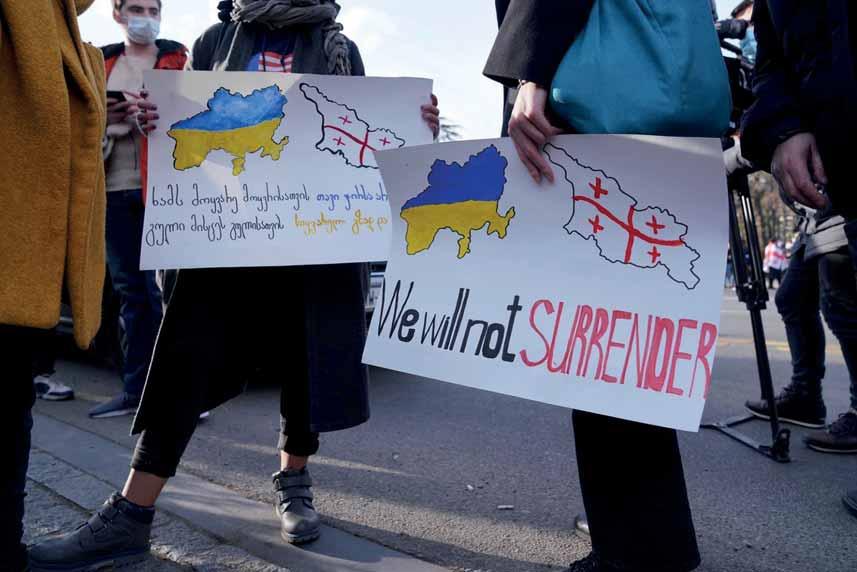
24 minute read
POLITICS
from Issue #1334
Russia’s Political and Military Demarche: More Explicitly on its Separate Aspects. Part I
BY VICTOR KIPIANI, GEOCASE CHAIRMAN
Advertisement
The crisis provoked by Russia, which has even been dubbed “organized chaos,” is a subject of daily discussions and evaluations. Almost all assessments can be summarized in one key message: Moscow is trying to radically change the essence of the order that took shape, fi rst, after the Second World War and then, after the end of the Cold War, in order to turn the balance of Euro-Atlantic power to its own advantage and make fundamental changes to the code of conduct in international relations by openly introducing power in it as a dominant component. That open and dangerous revisionism, as well as the undermining of the abovementioned, to put it mildly, imperfect model, having emerged after the aforementioned wars, takes place at the expense of Russia’s neighboring countries. Our intention is to discuss the “old-new” reality of this very neighborhood, of which Georgia is part, and to draw out conclusions that will be neither pleasant nor acceptable for all.
WITHOUT AN EXACT NAME?
Controversial has been a word (and a rather mild one) used to describe the reality around our country. We will try to explain why.
For many years, Georgia has continued to exist in uncertainty and to advance along the path of its civilizational choice. This path, which is marked both with achievements and failures, is distinguished for the strength of national consensus and a societal decision to see the country becoming a fully-fl edged participant of European political unity. Our journey along this path is supported and encouraged by Georgia’s partner countries. Nevertheless, we must admit that something in “our” and “their” movement towards each other does not fi t ideally. The question is where is that critical point of divergence which despite a very long section walked through by both parties, makes the prospect of fi nishing this path so distant that it is impossible to reach out and fi rmly clasp our hands. It should be noted that this joint project of Georgia-Euro-Atlantic partnership is, at fi rst glance, fl awless both in its form and substance: against their continuous supportive assessments and steps, the Georgian state continues to do, though not always impeccably, its homework and advance towards the set goal. Why does then a segment of supporters of this process feel somewhat dissatisfi ed? Has the time not come to start openly discussing reasons of this dissatisfaction?
The time has clearly come. Let me remind those thinking that discussion of this issue is untimely that the Russian demarche has left no time and room to either Georgians or our Western partners for “averaged” explanations. As regards an inadequate movement of Georgia and its Western partners towards each other, the reason of it, I believe, is the lack of capacity to take comprehensive (not partial), timely (not delayed), result-oriented (not effect-oriented) decisions as well as the lack of will to implement them. Against this backdrop and especially, in the situation created by the Russian demarche, the lack of capacity and will harms the joint project of Georgian-Western integration: it may slow down the rate of integration, while in terms of its outcome, may push our country from geopolitical uncertainty into a geopolitical abyss. We still have time left to avoid it, although the Russian demarche has further accelerated the countdown and virtually zeroed the time for extra exchange of useless pleasantries.
Image source: Twitter, Democracy Defenders Georgia
WHY DOES IT HAPPEN AS IT DOES?
The existence of our country in a protracted and now already very dangerous geopolitical uncertainty is a result of more complex events and processes in the post-Soviet and post-Cold War period. Today, this topic has already been actively and impartially discussed in Western studies, providing a unique opportunity for interested readers to enhance their mindset.
Thus, the situation that resulted from the recent Russian demarche is not a reverberation of either current moment or of previous year or two. It is an indirect effect of the abovementioned defi cit in practical Western politics towards post-Soviet countries in the so called “buffer zone,” which Russia has exploited directly and boldly to strengthen its infl uence on countries of that zone. Using not only covert but also overt forms of aggression, it has erected actual barriers to the West preventing it from freely entering Russia’s neighborhood, while by taking the current demarche, it tries to obtain a formal consent from the West on legalizing those barriers as “red lines.”
The explanation of the Russian approach does not offer the Georgian audience anything new. The only thing that changes from one demarche to another is the scale of the approach, actors and concrete factual circumstances of covert or overt aggression. However, compared to any previous case, the foreign-military line pursued by Russia since last November is unprecedented by the scale of intent and far-reaching implications of the set objective: Russia demands the consent of the West on the recognition of Russian version of Monroe Doctrine in the post-Soviet space. It demands, not requests.
Possible scenarios of further developments are not a topic of this paper; instead, we want to draw your attention to several of those aspects that brought us and our partners to the current crisis. The key question now, in my opinion, is: What has our joint integration project “done so wrong” that must be necessarily and quickly rectifi ed in order to escape a more severe and damaging consequence for the project?
TWO SIDES OF THE SAME COIN: AS ALWAYS
Thus, neither history nor practice tells us anything new about Russia’s “political taste” and way of action. Consequently, it is more interesting to analyze Western elements of equation which has been fi nally exposed as a result of the recent demarche.
The use of word “equation” is not incidental because I would compare the Western-Russian interaction in the socalled “buffer” neighborhood to a “seesaw” type equation. It is this strange equation that largely causes that dissatisfying uncertainty where Georgia and the West, against specifi c attention, supporting statements and declarations of concerns from the West, have been moving in parallel with the formal Rubicon of Georgian-Western integration for many years now but have not been able to cross that Rubicon yet.
It seems that Moscow is not very concerned about such “parallelism” between us and the Western partners; this tolerance by Moscow may be also explained by the following: in the conditions of politics that is constantly defi cient for achieving the abovementioned principled and tangible result, Russia expects (expected?) that statements of the West about full and not partial integration with the West will lose a reputational power, while Georgia and other countries that pursue a pro-Western course will get tired of doing never-ending homework for integration. That will make it easier to absorb Russia’s bordering countries into the unrecognized-bythe-West “sphere of infl uence” of Moscow. The current demarche has added yet another puzzle to this unfavorablefor-us equation: Does Russia think that the time has come for a decisive phase in the process of discreditation of the West and fatigue with the West in Georgian, Ukrainian or other societies? This totally non-rhetorical question requires a practical answer from the West, even more so, today and now. Although it might seem strange, the Russian demarche may have unintentionally, by giving such answer, only accelerated the issue of Georgia and other similar countries stuck in geopolitical uncertainty. If we agree that it has accelerated, it now becomes interesting as to how and with what result.
IMPOSSIBILITY TO STAY LONGER IN A “COMFORT ZONE”
Separation of impressive speech and politically effective action has become an ailment of our time and political culture (or lack of culture). In the past few decades, this ailment which is called real politics but in colloquial language “trading,” has gained ground in the fi eld of international relations. We should get used to such transformation of global politics, adjust to it and confront it with our own, national political-diplomatic antidote. We would advise those in the Georgian society who still do not admit it to step aside and clear the way for those who have already realized that universal idealism has been replaced by conjunctural pragmatism, while the politics of values has cleared the way for the geopolitics of infl uences and interests, even more so, much more openly and unabashedly than ever before.
Such description of the current international arena is, by the way, a direct result of changes that have taken place in Western politics since the fi rst decade of the 2000s, while a number of leaders of the 21st century may claim the coauthorship of the rules of the game.
Although it might seem strange, the Russian demarche may have unintentionally only accelerated the issue of Georgia and other similar countries stuck in geopolitical uncertainty
Between A Rock And A Hard Place: Alternatives To Partnership For Georgia And Ukraine
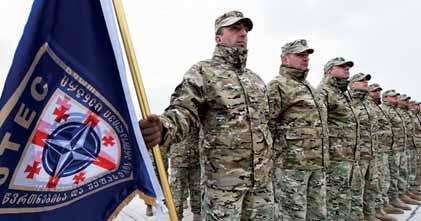
Georgian soldiers participate in a NATO training operation. Vano Shlamov/AFP
BY MICHAEL GODWIN
The prospect of NATO membership has been a longaftersought goal for many aspiring nations, particularly Ukraine and Georgia. With its immense national security, economic, and political benefi ts, the ascent to such an organization would pay dividends for the small embattled nations still facing down the Russian bear. However, in addition to this hurdle, both nations have faced internal social and political strife that further distances the prospect of membership.
Finding a form of middle ground between isolation and NATO integration may become an interim solution for the two. As Poland, Ukraine, and the UK are in the process of entering into a prospective agreement, it is not outside the realm of supposition and possibility that an alliance of the “buffer states” could be benefi cial for both its members and NATO and the West. Acting as both a physical and political intermediary, this could also act to deter unnecessary confl ict through its own agreements with both NATO and Russia, or its CSTO.
While this idea of being a mediator is good in practice and in the charter of such an organization, it can be surmised that NATO is more likely to warm up to the new alliance than Russia. However, this is not to say that adding a third party may encourage the Kremlin to take a more reasonable stance in its regional relations. As current geopolitics stand at the time of writing, the new alliance may turn into a type of “feeder” organization for NATO, given the leanings of the proposed members.
In examining the new UK-PolandUkraine alliance, this serves as a potential template. Developing both trilateral trade and European security, it also serves as a platform for combined defense for Ukraine in the face of NATO’s hesitancy to make affi rmative moves for their eastern neighbor. Ukrainian Foreign Minister Dmytro Kuleba framed its mission given the current state of regional affairs by stating, “We cannot expect safety and prosperity somewhere in the future when we become members of the EU and NATO. We need them today.”
This raises the matter of what the composition of this extra-NATO alliance would be. Georgia, Ukraine, and Moldova would most assuredly be keystone partners in its founding. Adding to this number could be the Baltic States, bringing in a northern component to the alliance. Together, these are all tied through unifi ed preservation of European unity, seamless trade policy, and combined multiregional defense.
Including this mixture of existing NATO members and NATO aspirants lends itself to becoming a type of “feeder organization.” Not unlike some clubs or schools being feeders to larger or more prominent universities, this could act as a proverbial “purgatory” before elevating to the lofty heights of full NATO membership. This mechanism would, however, dissolve its credibility as being the aforementioned mediator between NATO and Russia’s CSTO.
The unity of these three nations, sharing the pain and tragedy of Russian abuse, creates an atmosphere of hope for their peoples. Moldova since 1992, Georgia since 2008, and Ukraine since 2014, also need material, diplomatic, economic, and military support from NATO and the collective West. This organized alliance creates the avenues for that assistance to be channeled in an organized and signifi cant way. In combination, it also allows the otherwise small and easily overlooked nations a larger voice at the table with other larger powers.
By creating this formal connection between NATO and this alliance, the “Black Sea Coalition,” as a working title, also acts as a counter balance to the hefty weight Russia throws around in the region. Additionally, this extends out of the Black Sea to the Eastern Mediterranean where Russia continues to support the oppressive regime of their latest puppet, Bashar al-Assad. To the East, having this link to Central Asia works as a furtherance of technological and economic development connections with the West.
Poland has pioneered this model, particularly in the words of their Prime Minister, Mateusz Morawiecki. In speaking with his Ukrainian and UK counterparts, he outlines clearly the strife nations like his deal with, saying, “Living close to a neighbor like Russia, we have the feeling of living at the foot of a volcano.” Other diplomats of Eastern European nations have echoed this sentiment, displaying the troubles when living within the crosshairs of Putin.
A recent roundtable discussion hosted by the Georgian Institute of Politics covered the role of Georgia within this context. With notable participants such as Nona Mamulashvili and Elene Khoshtaria, the topic of Georgian cooperation with Ukraine and Moldova, given that NATO aspirations seem distant in the political scope, was discussed. Professor Stephen Jones, an expert in Russian and Eurasian studies, expressed a similar sentiment in that Ukraine’s future in regards to Russia is interlinked with Georgia’s relationship with the same. The prospect of EU and NATO membership for Georgia is something Putin cannot accept, and as a result will do everything to prevent from becoming a reality.
Jones noted that while the West has not been a supremely great ally to Georgia in the past, it is the best chance for socio-political advancement. Georgia is already the only country in the Caucasian region that has any real democratic model in place. In fact, Professor Jones explains that the strongest foreign policy weapon Georgia can wield against the Kremlin is the pursuit of Western model democracy, not only for the betterment of its citizens, but for its own national security interests.
As a result of this, in the larger picture, Ukraine and Georgia’s respective sovereignties are tied to the same dependencies: democracy and Western integration. Uniting these nations, along with Moldova, brings these combined interests under one formal label, strengthens political and economic ties, and establishes concrete defense corridors in the contested Black Sea region. If NATO membership is outside the realm of short-term reality, then an interim alliance can only help to elevate and encourage these nations to fulfi ll membership requirements as well as advancing domestic and foreign policy for the countries involved.
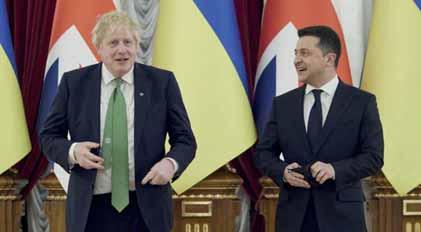
Ukrainian President Volodymyr Zelensky, right, and British Prime Minister Boris Johnson attend their meeting at the Mariinsky Palace in Kyiv, Ukraine, on February 1. Source: EPA - EFE/Presidential Press Service
Russia’s Vision of “Limited Sovereignty”
BY EMIL AVDALIANI
Moscow’s decision to activate CSTO signals the emergence of an entirely new approach in relations between Russia and its immediate neighborhood.
The Kremlin has always argued its special interests in and ties to what once constituted the Soviet space. What Russia struggled with though was to produce a smooth mechanism on how to deal with the neighborhood where revolutionary movements toppled Soviet and post-Soviet era political elites. This happened in Georgia, Ukraine, Moldova, Kyrgyzstan and recently was attempted in Kazakhstan.
Russia’s responses differed and depended on each specifi c case, but mostly were based on using separatism in the neighboring states to preclude Westward aspiration. Rarely did Russia get support for its actions from its allies and partners. This created tensions, underlined the lack of legitimacy, and generated acute fear even from relatively friendlier states that Russia one day could turn against them.
But with CSTO activation in Kazakhstan, it seems to be an entirely different matter. Here, Moscow employed an element of multilateralism. It worked, as it seemed to be a group effort, though it

Service members take part in joint military drills for the Collective Security Treaty Organization in Balykchy, Kyrgyzstan, September 2021. Image source:VYACHESLAV OSELDEKO/AFP / GETTY IMAGES was Russia which pulled the strings and contributed most of the forces sent to Kazakhstan.
CSTO activation is also about something else. It blurred the boundaries between Russia's security and the security of neighboring states. Putin stated the situation in Kazakhstan concerned “us all,” thereby ditching the muchcherished "Westphalian principles" of non-intervention into the internal affairs of the neighboring states. The emerging Russian vision, therefore, is about applying intervention when security is challenged. In many ways, Russia always wanted to imitate the US, which in its unipolar moment often resorted to military campaigns to alter the nature of regimes in the Middle East. Liberal internationalism, with an emphasis on human rights, allowed America and its allies to operate with a certain level of legitimacy and moral obligation. Russia lacked such ideas. Until now. Upholding security and supporting conservative regimes has now turned into Moscow’s offi cial foreign policy tool. Protests in Belarus and Kazakhstan helped the Kremlin streamline this vision.
Since Moscow considers its neighbors unstable, the need for intervention when security is threatened could now serve as a new dogma. It does not mean that the CSTO will exclusively be used in future when it comes to crises along Russian borders. On the contrary, Russia will try to retain maneuverability and versatility in its moves. The CSTO option will be kept as yet another element in “pacifying” its neighborhood.
Tied to upholding security in the neighborhood, Russia also advances the concept of “limited sovereignty,” whereby Moscow allows its neighbors to exercise only a limited level of foreign policy. Significant maneuverability will be deemed as dangerous, possibly upending Russia’s interests.
More importantly, the events in Kazakhstan also showed that Russia is now offi cially intent on upholding the conservative-authoritarian regimes. This fi ts into the broader phenomenon scholars have been arguing recently, of authoritarians helping other authoritarians. Moscow is essentially exporting its own model abroad, an export which includes essential military and economic help to shore up faltering regimes.
But Moscow does this also for the multiple opportunities its help would provide. Take, for instance, Belarus, where with Russian help the current leader Lukashenko managed to maintain his position. The end result is Minsk being ever more beholden to Moscow and essentially negating any remnants of multi-vector foreign policy it tried to pursue before 2020.
A similar scenario is now opening up in Kazakhstan. The country, which famously managed to strike a balance between Russia and China and even work with the US, while inviting multiple foreign investors, will now be effectively pursuing a different mode of relations with Moscow that will be similar to the Belarus scenario, short of integration talks. Russia fears crises, but it is learning to benefi t from them, and this is the most striking development in Moscow’s foreign policy. In a striking difference how Russia handled Georgia and Ukraine, its ability to navigate Belarus and Kazakhstan and the Armenia-Azerbaijan confl ict shows evolution.
Russia thus unveils a new vision for its neighborhood. It is essentially a concept of hierarchical order where Russia is at the top of the construct and the neighbors have to abide by specifi c rules. Failure to do so will produce a concerted military response.
It is Much More Than Just Ukraine
ANALYSIS BY EMIL AVDALIANI
Awar scare in Ukraine is a pivotal moment for the West. It tests the transAtlantic resolve, its unity, and the very foundations of NATO. Failure to prevent a potential Russian military move or unwillingness to cope with if such a move is made will likely result in an accentuation of internal divisions within NATO and the EU. But more importantly, the reluctance and hesitation will impact those which aspire to become members of Western organizations or who see the West as a balancing foreign policy tool against Russian infl uence. The escalation around Ukraine is being watched by the wider Black Sea region and the South Caucasus states which feel most vulnerable to Russia’s infl uence. Failure to avert a Russian offensive, and most importantly connivance to Moscow’s effort to scare Kyiv, will have a profound impact on pro-Western Georgia and Moldova, with some signifi cant implications for the Caspian and Central Asia regions.
An aggravating development is that the public debate on the implications of the Ukraine-Russia standoff is largely muted. For instance, few politicians if any openly ponder in Georgia what happens in Ukraine. Reasons vary. The inward-looking manner of Georgian politics is certainly a driver. Second could be a geopolitical motive of avoiding being enmeshed in the struggle, where Tbilisi thinks it might get little benefi t. Yet a third reason is the fear of potential Russian reprisal.
Moldova too can do little, and, in fact, the country navigates carefully not to cause Moscow’s ire. Armenia and Azerbaijan are more pre-occupied with solving their border and transport corridor issues. Each does not want to incur a negative Russian response amid ongoing trilateral railway revival negotiations, headed by Moscow, and the West’s relative distancing from the wider South Caucasus, best exemplifi ed by the second Nagorno-Karabakh war.
Further east, in Central Asia, the region benefi ts from being distant from the Russia-Ukraine conundrum. Here, too, the threat of a Russian response far outweighs the benefi ts the regional countries could get in case of however vague the diplomatic support they could express toward Kyiv or Moscow. Kazakhstan is especially vulnerable to Russian pressure and is often irritated by nationalistic statements by Russian politicians on the weaknesses of Kazakh statehood.
The Ukraine gambit thus will be giving the Kremlin far bigger momentum than what many an analyst thinks in the West. It is a version of reasserting infl uence which goes far beyond Ukraine, and approximately covers what once constituted the Soviet empire. Through potential battering of its western neighbor, Moscow will be sending an example of what might befall any of those neighbors who deviate from the Russian geopolitical agenda.
The invasion of Georgia in 2008, instigation of the separatist war in eastern Ukraine, and the annexation of Crimea in 2014, touched upon the very foundations of the liberal world order. Back then, Russia risked and feared being isolated. Presently, however, the global shifts in power provide a promising setting for Moscow to act. Previously, Moscow was pressuring neighbors to say no to Western aspirations; now Russia demands offi cial guarantees from the Western powers.
Moscow also hopes that the war scare around Ukraine will be used as a distraction by China to ramp up pressure around Taiwan or perhaps to even aim at something bigger. The China challenge is critical for Washington, and focusing on it makes sense. But the problem is that ignoring the Russian move could actually make the effectiveness of the Chinese policy more traumatic. Increasingly for the US it is a prospect of the two fronts dilemma, not necessarily a military two front, but rather intermittent pressuring on two fronts, which, while it does not evolve into an open confl ict, could eventually see a dilution of America’s resolve and push it into some sort of settlement. Yet a more promising picture too can be drawn. Russia’s potential move deep into Ukraine could actually produce not only positive sentiments in the West toward Kyiv, but also infl uence the longterm policy toward the wider Black Sea region. There was a certain stalling of EU/NATO expansion plans. Moreover, along with pure geopolitical motives (Russian military moves) which prevented the enlargement, fatigue with Georgia, Ukraine and Moldova too was evident.
The pressure on Ukraine could be a turning point when morale and pure geopolitical motives coincide and necessitate a more robust Western engagement with the arc of instability along Russian borders. Instability is what Russia feeds on. A stable neighborhood, therefore, is a blockage to the array of Russian tools of infl uence.
This will be especially opportune for Moldova and Georgia, where ambivalence toward the West’s willingness to engage has never dissipated. Renewed engagement will strengthen these states’ efforts to build liberal democracy. The latter concept is endangered as it is increasingly being ambushed by illiberal and openly anti-liberal forces.
In the longer run, and strangely enough, Russia’s hanging threat strengthens the neighboring nations. True, they are fragile and vulnerable, but constant menacing re-invigorates the national energies of Ukraine and other nations. Modern Ukraine differs from the pre-2014 one. So too the Central Asian and South Caucasus states. The threat also reanimates the Western resolve. In many ways this is a pivotal moment for the trans-Atlantic community, as critics of NATO might face the insurmountable evidence of the need to keep and strengthen the institution.
Inability to prevent Russia’s potential military move into Ukraine will have ramifi cations far beyond in the South Caucasus and Central Asia
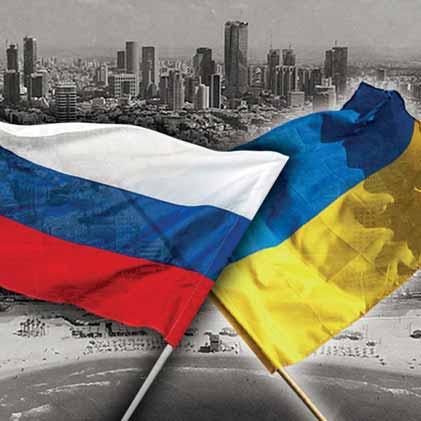
Image source: haaretz.com
Emil Avdaliani is a professor at European University and the Director of Middle East Studies at Georgian think-tank, Geocase.
Political Round-Up: Ministers Reshuffl e; France Backs Regional Peace
BY KETEVAN SKHIRTLADZE
Many political events unfolded during the week, kicking off with the presidents of Georgia and Poland, Salome Zurabishvili and Andrzej Duda, expressing solidarity with Ukraine.
Polish President Andrzej Duda, who was on a transit visit to Tbilisi on his way to Beijing, held a press conference together with President Zurabishvili, seeing the two expressing solidarity with Ukraine, stressing the need to de-escalate the situation, and thanking each other for the information exchanged.
President Zurabishvili said that “those aggressive actions and threats, cyberattacks, excessive increase of military forces on the border with Ukraine or the intensifi cation of forces on the Black Sea, are signs of the extent to which Russian policy has turned to provocation.”
“Georgia has a bit of a tragic experience with Russia – our joint consultations are very important,” President Duda noted.
SAAKASHVILI CALLS OUT BIDZINA
In Tbilisi, the trial of the third President of Georgia, Mikheil Saakashvili, is ongoing. This week, in response to Georgia’s noticeable lack of support voiced for Ukraine, Saakashvili sang the Ukrainian national anthem in the courtroom, and went on to address Bidzina Ivanishvili, "You made the wrong move betting on Putin’s victory.” He went on to question the fact that Prime Minister Irakli Garibashvili and Minister of Foreign Affairs Davit Zalkaliani contracted Coronavirus at a time when the situation in Ukraine was tense.
“Garibashvili got infected with Covid when Andrzej Duda was coming. He can talk to Salome Zurabishvili about the weather, but she doesn’t decide anything. He demanded a meeting with the Prime Minister, but Garibashvili disappeared, saying he was infected with Covid.
“Then, when the UK Foreign Minister was about to call, Zalkaliani contracted Covid. As if he could not speak while ill. Then they said ‘let’s talk at the deputy level,’ but all four were busy.
“In short, you completely failed in this situation,” Saakashvili told Ivanishvili, adding that Georgia is “completely alone against possible Russian aggression.”
The convicted ex-president left his trial early, having pleaded innocent and claiming that his verdict “has been decided in advance by the founder of the Georgian Dream, Bidzina Ivanishvili.” Of course, I remain a loyal member of our team,” Turnava said.
Turnava was replaced by former Minister of Agriculture, Levan Davitashvili. Otar Shamugia, Davitashvili’s former deputy, has been appointed as his replacement, nominated for the post by the Prime Minister of Georgia, Irakli Garibashvili.
“It is a great honor and responsibility for me to serve my country with a very strong team and contribute to the development of both the environment and agriculture,” Shamugia said. appointed Otar Danelia to the position of Business Ombudsman of Georgia.
Garibashvili met Danelia at the Government Administration and wished him success in his new capacity. He highlighted that support of the private sector is a priority for the national authorities, as facilitation of business is a prerequisite of economic growth and employment in the country.
He then gave specifi c instructions to the newly-appointed Business Ombudsman and noted that open cooperation with the private sector, few barriers and the least bureaucracy, are essential. The meeting also focused on the signifi cance of greater ease of corporate access to public services.
Otar Danelia was formerly the First Deputy Minister of Economy and Sustainable Development.
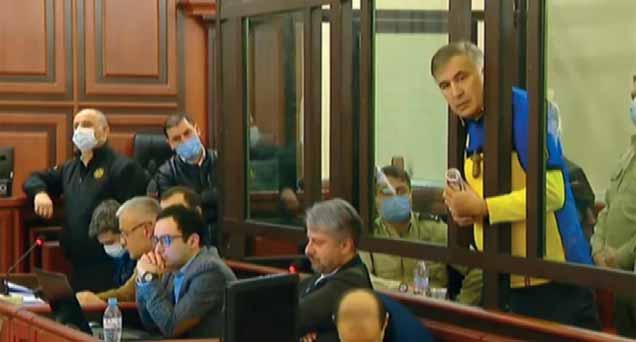
FRANCE AND RUSSIA
In international news, President of France, Emmanuel Macron, met with Russian President Vladimir Putin in Moscow.
There, Macron emphasized that the independence and sovereignty of Georgia, Ukraine, Belarus, and Moldova must be protected.
“We need processes based on transparency, de-escalation. We must build security by respecting the sovereignty and independence of states that are not members of the European Union or NATO but are located in the region. Belarus, Ukraine, Georgia, and Moldova are countries, the sovereignty and independence of which we must respect, as this is also part of our collective security,” Macron said after meeting with Putin.




